Comparative Analysis of Consumer Protection in Bangladesh
VerifiedAdded on 2021/09/10
|22
|5586
|71
Report
AI Summary
This report, submitted by a group of students from Comilla University's Department of Finance and Banking, provides a comprehensive analysis of the Consumer Protection Act and its practices in Bangladesh. The report begins with an introduction to consumer protection law, highlighting the need for such laws and the historical context in Bangladesh. It then delves into the existing legal framework, including key acts like the Essential Commodity Act, Pure Food Ordinance, and the Consumer Rights Protection Act 2009, as well as the opinions of consumers regarding these laws. The report examines the present situation of consumers in Bangladesh, addressing issues like preservatives, adulteration, and major problems faced by consumers. It concludes with recommendations and implementation strategies for improving consumer protection, emphasizing the importance of consumer awareness and the role of consumer organizations. The methodology used in this study involves secondary data collection from various sources, and the report acknowledges its limitations. The study underscores the significance of the Consumer Rights Protection Act 2009 and its objectives to safeguard consumer rights.
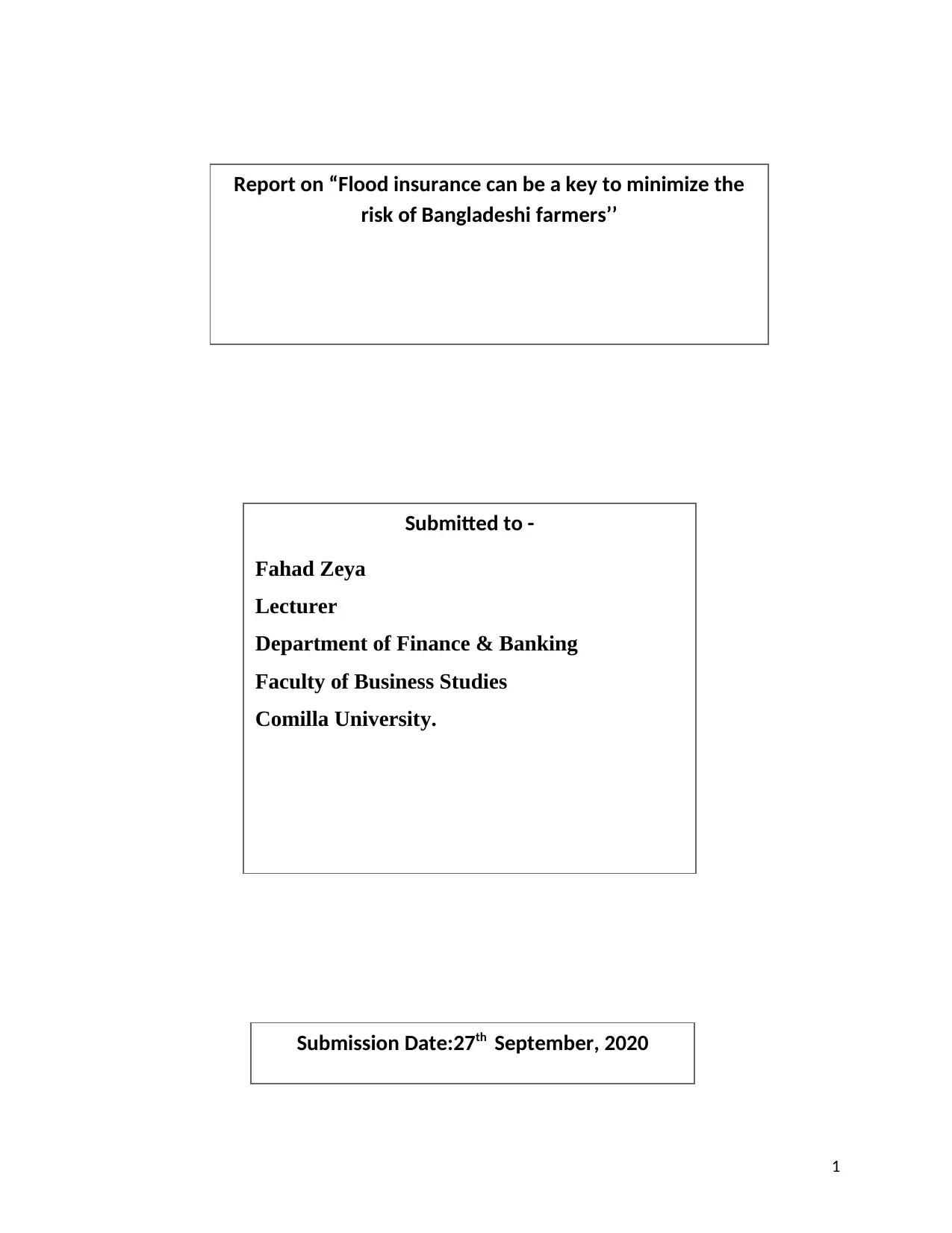
1
Report on “Flood insurance can be a key to minimize the
risk of Bangladeshi farmers’’
Submitted to -
Fahad Zeya
Lecturer
Department of Finance & Banking
Faculty of Business Studies
Comilla University.
Submission Date:27th September, 2020
Report on “Flood insurance can be a key to minimize the
risk of Bangladeshi farmers’’
Submitted to -
Fahad Zeya
Lecturer
Department of Finance & Banking
Faculty of Business Studies
Comilla University.
Submission Date:27th September, 2020
Paraphrase This Document
Need a fresh take? Get an instant paraphrase of this document with our AI Paraphraser
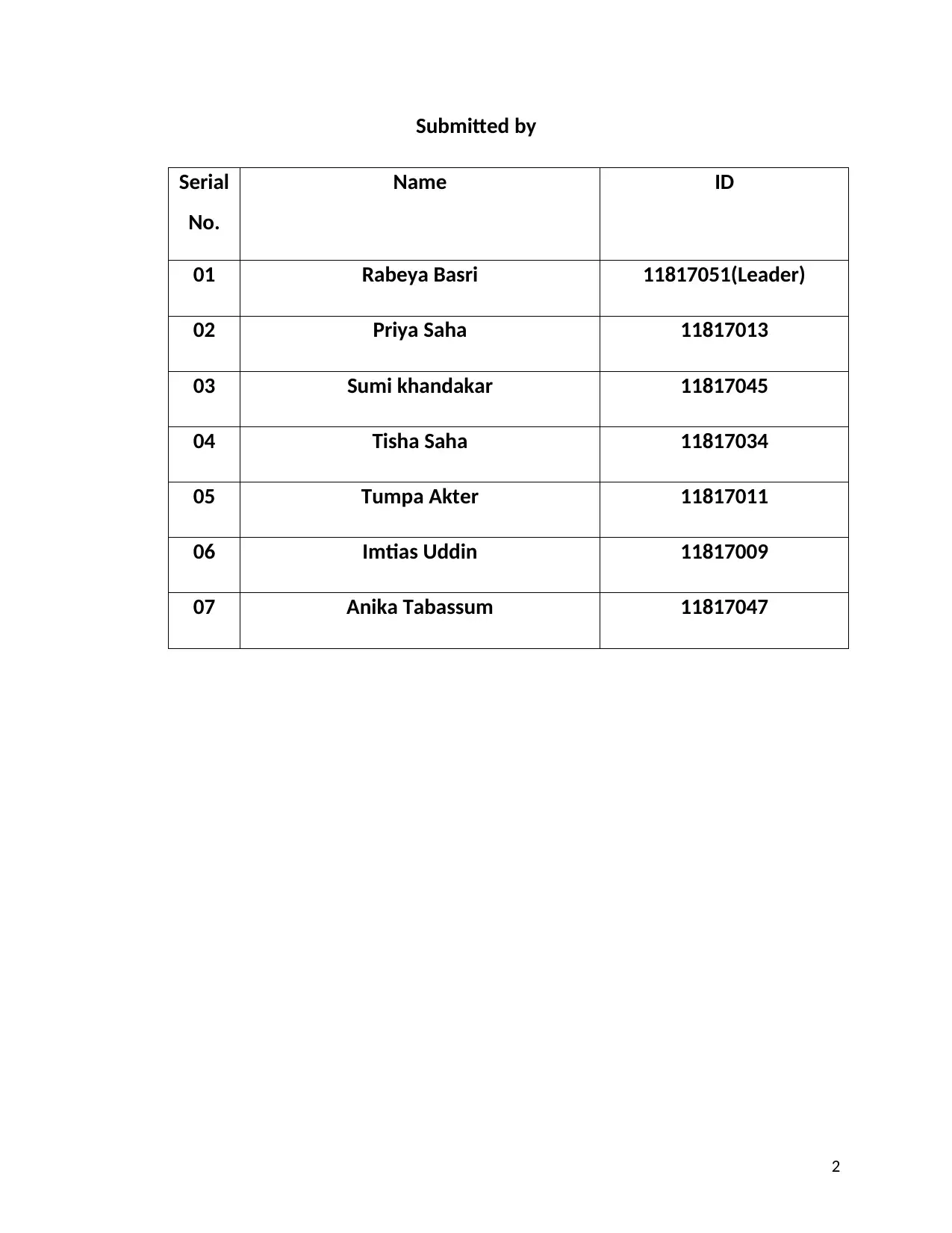
Submitted by
Serial
No.
Name ID
01 Rabeya Basri 11817051(Leader)
02 Priya Saha 11817013
03 Sumi khandakar 11817045
04 Tisha Saha 11817034
05 Tumpa Akter 11817011
06 Imtias Uddin 11817009
07 Anika Tabassum 11817047
2
Serial
No.
Name ID
01 Rabeya Basri 11817051(Leader)
02 Priya Saha 11817013
03 Sumi khandakar 11817045
04 Tisha Saha 11817034
05 Tumpa Akter 11817011
06 Imtias Uddin 11817009
07 Anika Tabassum 11817047
2
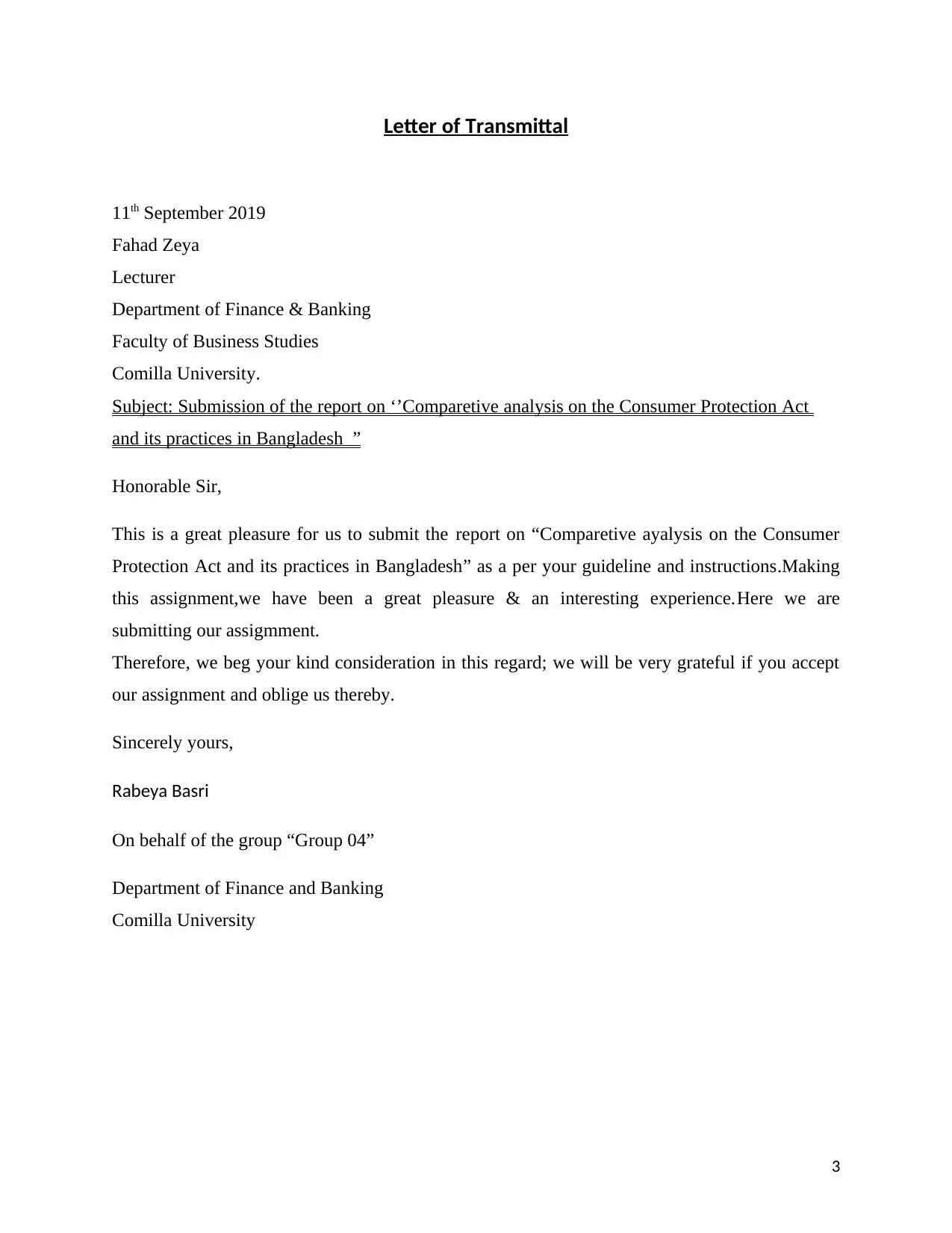
Letter of Transmittal
11th September 2019
Fahad Zeya
Lecturer
Department of Finance & Banking
Faculty of Business Studies
Comilla University.
Subject: Submission of the report on ‘’Comparetive analysis on the Consumer Protection Act
and its practices in Bangladesh ”
Honorable Sir,
This is a great pleasure for us to submit the report on “Comparetive ayalysis on the Consumer
Protection Act and its practices in Bangladesh” as a per your guideline and instructions.Making
this assignment,we have been a great pleasure & an interesting experience.Here we are
submitting our assigmment.
Therefore, we beg your kind consideration in this regard; we will be very grateful if you accept
our assignment and oblige us thereby.
Sincerely yours,
Rabeya Basri
On behalf of the group “Group 04”
Department of Finance and Banking
Comilla University
3
11th September 2019
Fahad Zeya
Lecturer
Department of Finance & Banking
Faculty of Business Studies
Comilla University.
Subject: Submission of the report on ‘’Comparetive analysis on the Consumer Protection Act
and its practices in Bangladesh ”
Honorable Sir,
This is a great pleasure for us to submit the report on “Comparetive ayalysis on the Consumer
Protection Act and its practices in Bangladesh” as a per your guideline and instructions.Making
this assignment,we have been a great pleasure & an interesting experience.Here we are
submitting our assigmment.
Therefore, we beg your kind consideration in this regard; we will be very grateful if you accept
our assignment and oblige us thereby.
Sincerely yours,
Rabeya Basri
On behalf of the group “Group 04”
Department of Finance and Banking
Comilla University
3
⊘ This is a preview!⊘
Do you want full access?
Subscribe today to unlock all pages.

Trusted by 1+ million students worldwide
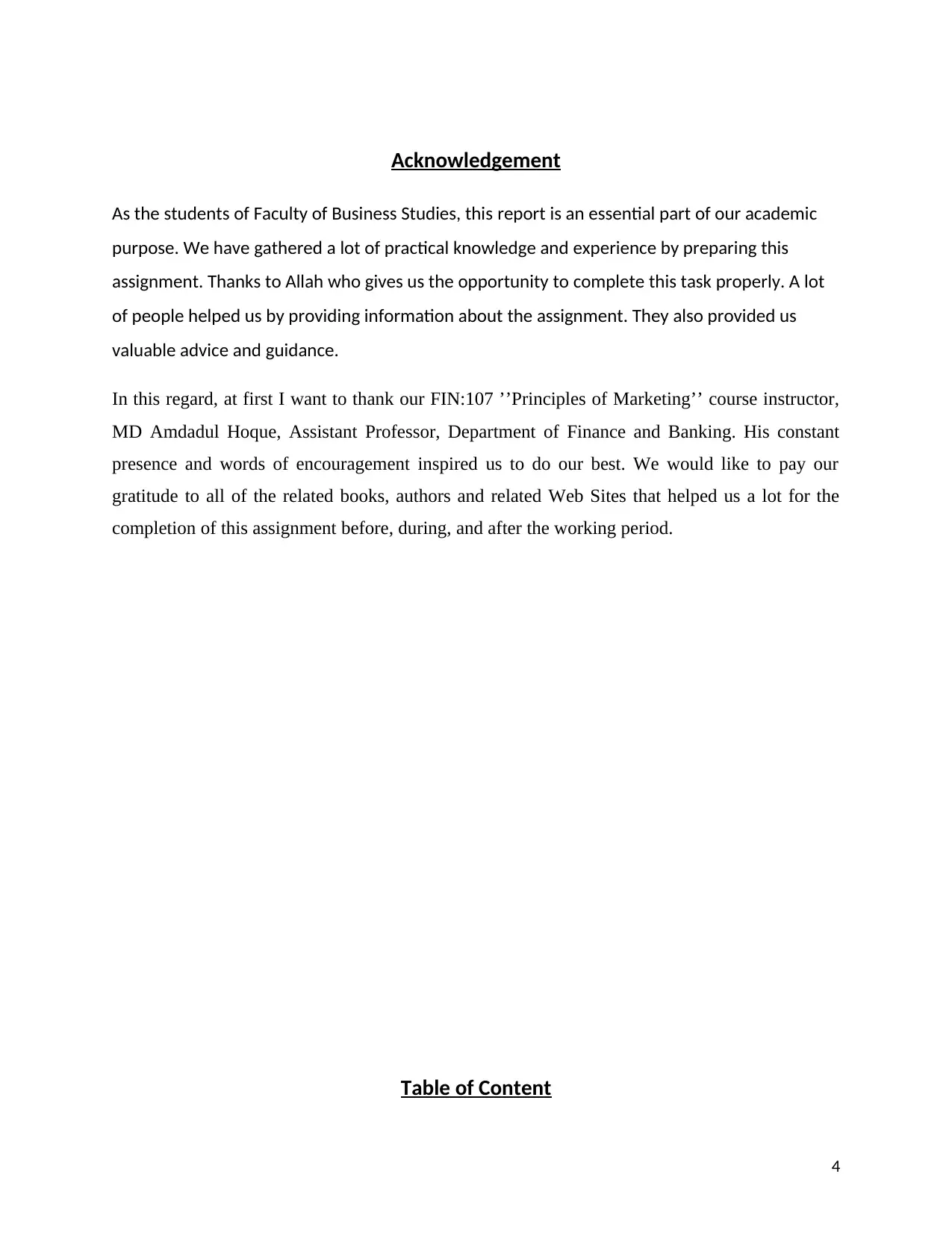
Acknowledgement
As the students of Faculty of Business Studies, this report is an essential part of our academic
purpose. We have gathered a lot of practical knowledge and experience by preparing this
assignment. Thanks to Allah who gives us the opportunity to complete this task properly. A lot
of people helped us by providing information about the assignment. They also provided us
valuable advice and guidance.
In this regard, at first I want to thank our FIN:107 ’’Principles of Marketing’’ course instructor,
MD Amdadul Hoque, Assistant Professor, Department of Finance and Banking. His constant
presence and words of encouragement inspired us to do our best. We would like to pay our
gratitude to all of the related books, authors and related Web Sites that helped us a lot for the
completion of this assignment before, during, and after the working period.
Table of Content
4
As the students of Faculty of Business Studies, this report is an essential part of our academic
purpose. We have gathered a lot of practical knowledge and experience by preparing this
assignment. Thanks to Allah who gives us the opportunity to complete this task properly. A lot
of people helped us by providing information about the assignment. They also provided us
valuable advice and guidance.
In this regard, at first I want to thank our FIN:107 ’’Principles of Marketing’’ course instructor,
MD Amdadul Hoque, Assistant Professor, Department of Finance and Banking. His constant
presence and words of encouragement inspired us to do our best. We would like to pay our
gratitude to all of the related books, authors and related Web Sites that helped us a lot for the
completion of this assignment before, during, and after the working period.
Table of Content
4
Paraphrase This Document
Need a fresh take? Get an instant paraphrase of this document with our AI Paraphraser
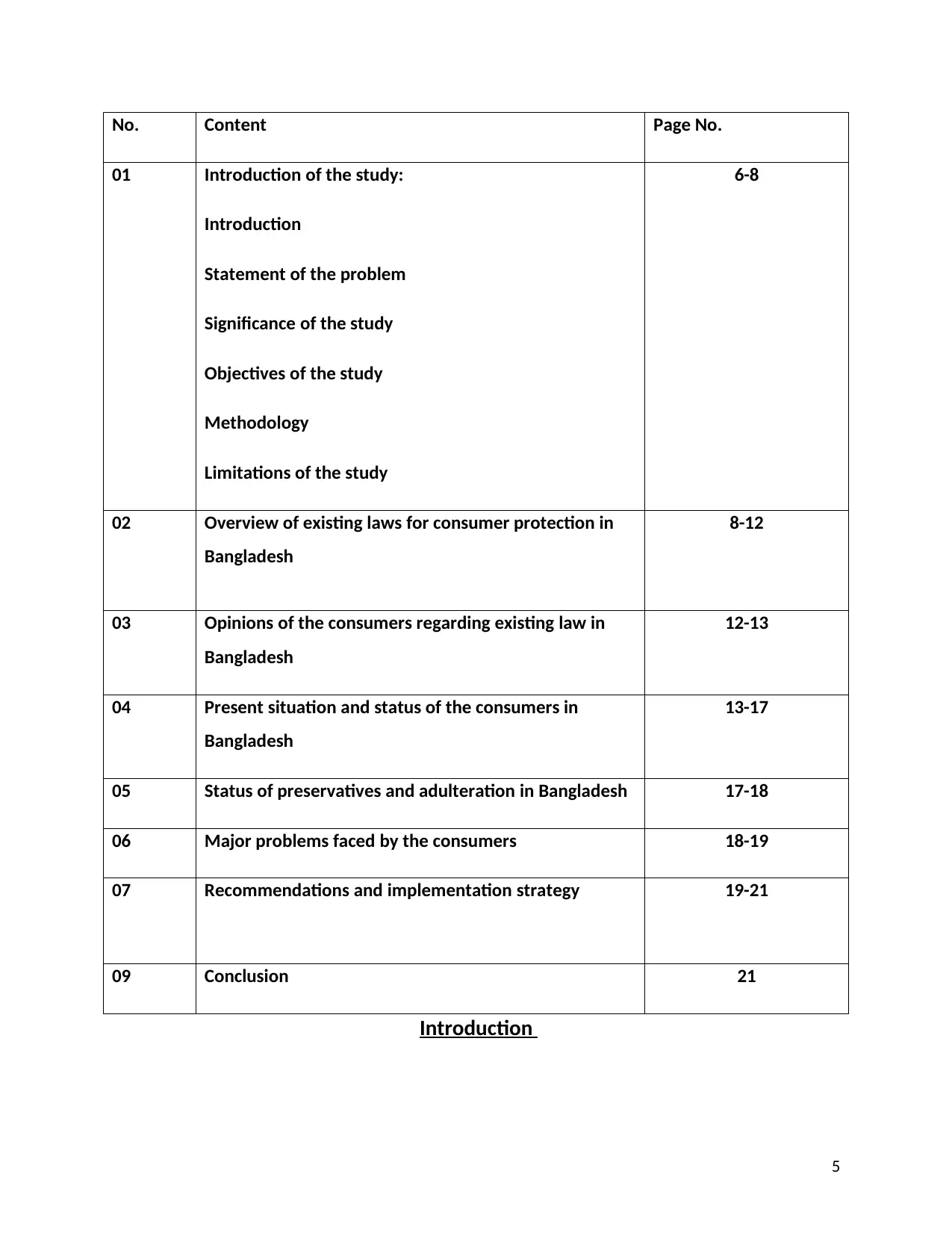
No. Content Page No.
01 Introduction of the study:
Introduction
Statement of the problem
Significance of the study
Objectives of the study
Methodology
Limitations of the study
6-8
02 Overview of existing laws for consumer protection in
Bangladesh
8-12
03 Opinions of the consumers regarding existing law in
Bangladesh
12-13
04 Present situation and status of the consumers in
Bangladesh
13-17
05 Status of preservatives and adulteration in Bangladesh 17-18
06 Major problems faced by the consumers 18-19
07 Recommendations and implementation strategy 19-21
09 Conclusion 21
Introduction
5
01 Introduction of the study:
Introduction
Statement of the problem
Significance of the study
Objectives of the study
Methodology
Limitations of the study
6-8
02 Overview of existing laws for consumer protection in
Bangladesh
8-12
03 Opinions of the consumers regarding existing law in
Bangladesh
12-13
04 Present situation and status of the consumers in
Bangladesh
13-17
05 Status of preservatives and adulteration in Bangladesh 17-18
06 Major problems faced by the consumers 18-19
07 Recommendations and implementation strategy 19-21
09 Conclusion 21
Introduction
5
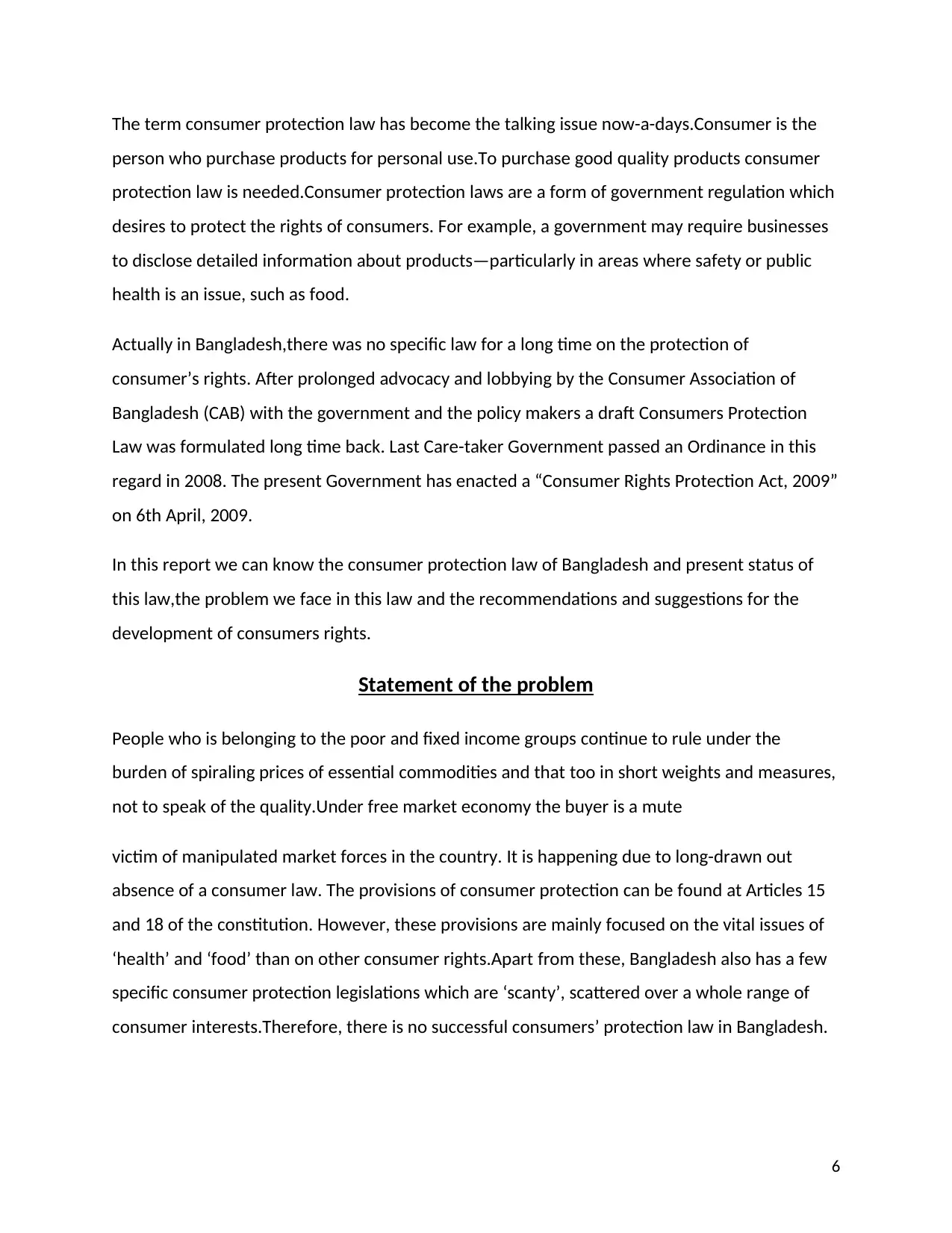
The term consumer protection law has become the talking issue now-a-days.Consumer is the
person who purchase products for personal use.To purchase good quality products consumer
protection law is needed.Consumer protection laws are a form of government regulation which
desires to protect the rights of consumers. For example, a government may require businesses
to disclose detailed information about products—particularly in areas where safety or public
health is an issue, such as food.
Actually in Bangladesh,there was no specific law for a long time on the protection of
consumer’s rights. After prolonged advocacy and lobbying by the Consumer Association of
Bangladesh (CAB) with the government and the policy makers a draft Consumers Protection
Law was formulated long time back. Last Care-taker Government passed an Ordinance in this
regard in 2008. The present Government has enacted a “Consumer Rights Protection Act, 2009”
on 6th April, 2009.
In this report we can know the consumer protection law of Bangladesh and present status of
this law,the problem we face in this law and the recommendations and suggestions for the
development of consumers rights.
Statement of the problem
People who is belonging to the poor and fixed income groups continue to rule under the
burden of spiraling prices of essential commodities and that too in short weights and measures,
not to speak of the quality.Under free market economy the buyer is a mute
victim of manipulated market forces in the country. It is happening due to long-drawn out
absence of a consumer law. The provisions of consumer protection can be found at Articles 15
and 18 of the constitution. However, these provisions are mainly focused on the vital issues of
‘health’ and ‘food’ than on other consumer rights.Apart from these, Bangladesh also has a few
specific consumer protection legislations which are ‘scanty’, scattered over a whole range of
consumer interests.Therefore, there is no successful consumers’ protection law in Bangladesh.
6
person who purchase products for personal use.To purchase good quality products consumer
protection law is needed.Consumer protection laws are a form of government regulation which
desires to protect the rights of consumers. For example, a government may require businesses
to disclose detailed information about products—particularly in areas where safety or public
health is an issue, such as food.
Actually in Bangladesh,there was no specific law for a long time on the protection of
consumer’s rights. After prolonged advocacy and lobbying by the Consumer Association of
Bangladesh (CAB) with the government and the policy makers a draft Consumers Protection
Law was formulated long time back. Last Care-taker Government passed an Ordinance in this
regard in 2008. The present Government has enacted a “Consumer Rights Protection Act, 2009”
on 6th April, 2009.
In this report we can know the consumer protection law of Bangladesh and present status of
this law,the problem we face in this law and the recommendations and suggestions for the
development of consumers rights.
Statement of the problem
People who is belonging to the poor and fixed income groups continue to rule under the
burden of spiraling prices of essential commodities and that too in short weights and measures,
not to speak of the quality.Under free market economy the buyer is a mute
victim of manipulated market forces in the country. It is happening due to long-drawn out
absence of a consumer law. The provisions of consumer protection can be found at Articles 15
and 18 of the constitution. However, these provisions are mainly focused on the vital issues of
‘health’ and ‘food’ than on other consumer rights.Apart from these, Bangladesh also has a few
specific consumer protection legislations which are ‘scanty’, scattered over a whole range of
consumer interests.Therefore, there is no successful consumers’ protection law in Bangladesh.
6
⊘ This is a preview!⊘
Do you want full access?
Subscribe today to unlock all pages.

Trusted by 1+ million students worldwide
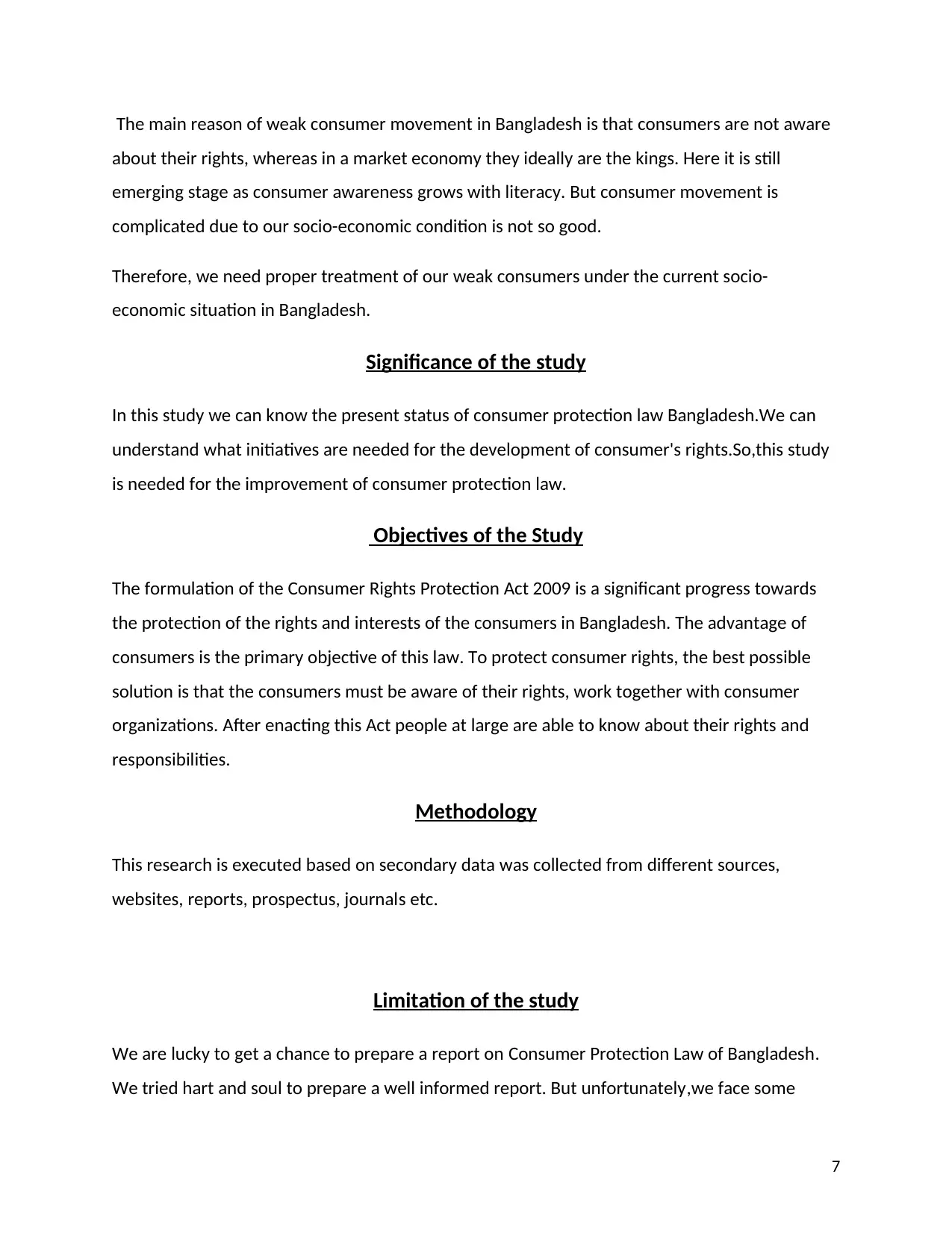
The main reason of weak consumer movement in Bangladesh is that consumers are not aware
about their rights, whereas in a market economy they ideally are the kings. Here it is still
emerging stage as consumer awareness grows with literacy. But consumer movement is
complicated due to our socio-economic condition is not so good.
Therefore, we need proper treatment of our weak consumers under the current socio-
economic situation in Bangladesh.
Significance of the study
In this study we can know the present status of consumer protection law Bangladesh.We can
understand what initiatives are needed for the development of consumer's rights.So,this study
is needed for the improvement of consumer protection law.
Objectives of the Study
The formulation of the Consumer Rights Protection Act 2009 is a significant progress towards
the protection of the rights and interests of the consumers in Bangladesh. The advantage of
consumers is the primary objective of this law. To protect consumer rights, the best possible
solution is that the consumers must be aware of their rights, work together with consumer
organizations. After enacting this Act people at large are able to know about their rights and
responsibilities.
Methodology
This research is executed based on secondary data was collected from different sources,
websites, reports, prospectus, journals etc.
Limitation of the study
We are lucky to get a chance to prepare a report on Consumer Protection Law of Bangladesh.
We tried hart and soul to prepare a well informed report. But unfortunately,we face some
7
about their rights, whereas in a market economy they ideally are the kings. Here it is still
emerging stage as consumer awareness grows with literacy. But consumer movement is
complicated due to our socio-economic condition is not so good.
Therefore, we need proper treatment of our weak consumers under the current socio-
economic situation in Bangladesh.
Significance of the study
In this study we can know the present status of consumer protection law Bangladesh.We can
understand what initiatives are needed for the development of consumer's rights.So,this study
is needed for the improvement of consumer protection law.
Objectives of the Study
The formulation of the Consumer Rights Protection Act 2009 is a significant progress towards
the protection of the rights and interests of the consumers in Bangladesh. The advantage of
consumers is the primary objective of this law. To protect consumer rights, the best possible
solution is that the consumers must be aware of their rights, work together with consumer
organizations. After enacting this Act people at large are able to know about their rights and
responsibilities.
Methodology
This research is executed based on secondary data was collected from different sources,
websites, reports, prospectus, journals etc.
Limitation of the study
We are lucky to get a chance to prepare a report on Consumer Protection Law of Bangladesh.
We tried hart and soul to prepare a well informed report. But unfortunately,we face some
7
Paraphrase This Document
Need a fresh take? Get an instant paraphrase of this document with our AI Paraphraser
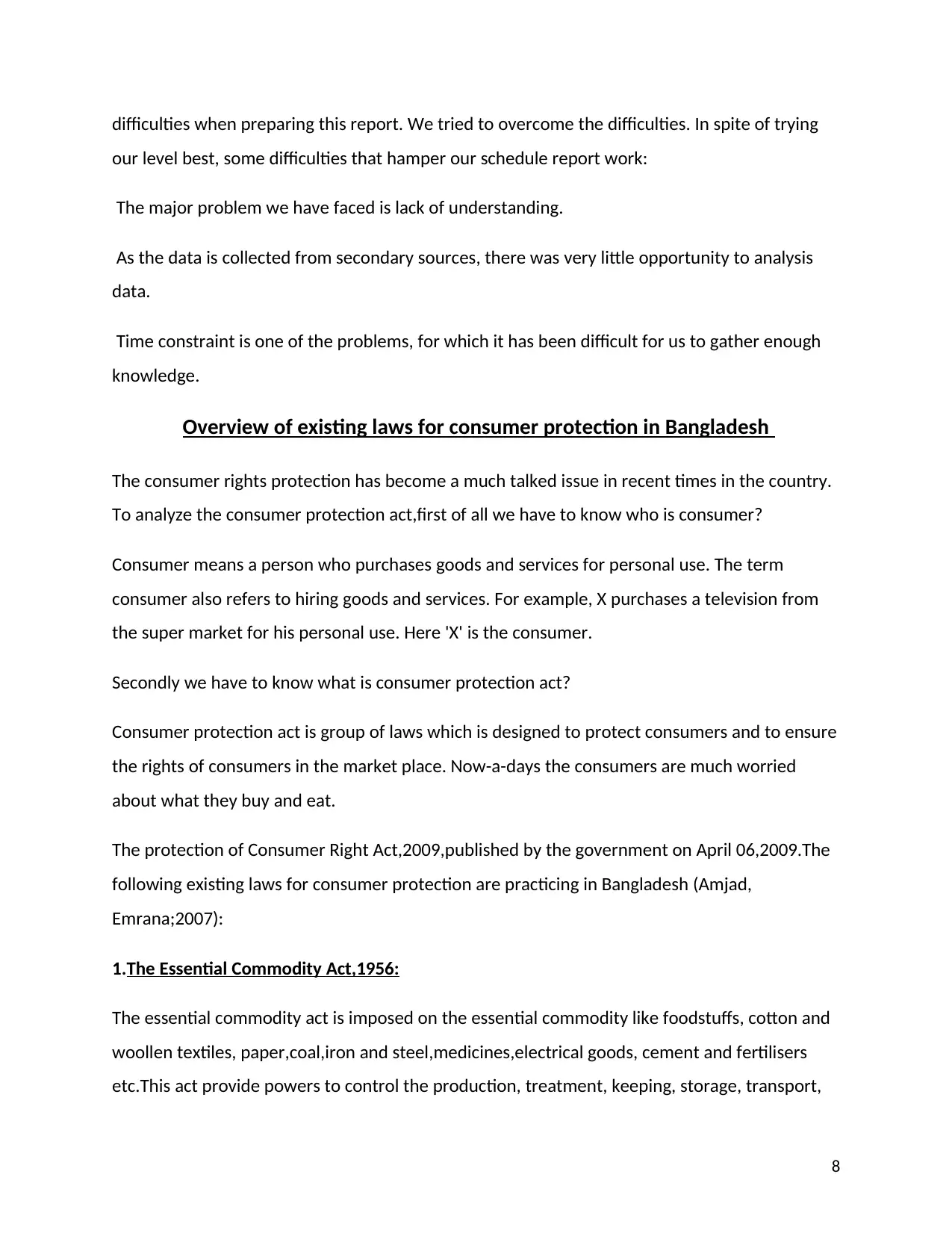
difficulties when preparing this report. We tried to overcome the difficulties. In spite of trying
our level best, some difficulties that hamper our schedule report work:
The major problem we have faced is lack of understanding.
As the data is collected from secondary sources, there was very little opportunity to analysis
data.
Time constraint is one of the problems, for which it has been difficult for us to gather enough
knowledge.
Overview of existing laws for consumer protection in Bangladesh
The consumer rights protection has become a much talked issue in recent times in the country.
To analyze the consumer protection act,first of all we have to know who is consumer?
Consumer means a person who purchases goods and services for personal use. The term
consumer also refers to hiring goods and services. For example, X purchases a television from
the super market for his personal use. Here 'X' is the consumer.
Secondly we have to know what is consumer protection act?
Consumer protection act is group of laws which is designed to protect consumers and to ensure
the rights of consumers in the market place. Now-a-days the consumers are much worried
about what they buy and eat.
The protection of Consumer Right Act,2009,published by the government on April 06,2009.The
following existing laws for consumer protection are practicing in Bangladesh (Amjad,
Emrana;2007):
1.The Essential Commodity Act,1956:
The essential commodity act is imposed on the essential commodity like foodstuffs, cotton and
woollen textiles, paper,coal,iron and steel,medicines,electrical goods, cement and fertilisers
etc.This act provide powers to control the production, treatment, keeping, storage, transport,
8
our level best, some difficulties that hamper our schedule report work:
The major problem we have faced is lack of understanding.
As the data is collected from secondary sources, there was very little opportunity to analysis
data.
Time constraint is one of the problems, for which it has been difficult for us to gather enough
knowledge.
Overview of existing laws for consumer protection in Bangladesh
The consumer rights protection has become a much talked issue in recent times in the country.
To analyze the consumer protection act,first of all we have to know who is consumer?
Consumer means a person who purchases goods and services for personal use. The term
consumer also refers to hiring goods and services. For example, X purchases a television from
the super market for his personal use. Here 'X' is the consumer.
Secondly we have to know what is consumer protection act?
Consumer protection act is group of laws which is designed to protect consumers and to ensure
the rights of consumers in the market place. Now-a-days the consumers are much worried
about what they buy and eat.
The protection of Consumer Right Act,2009,published by the government on April 06,2009.The
following existing laws for consumer protection are practicing in Bangladesh (Amjad,
Emrana;2007):
1.The Essential Commodity Act,1956:
The essential commodity act is imposed on the essential commodity like foodstuffs, cotton and
woollen textiles, paper,coal,iron and steel,medicines,electrical goods, cement and fertilisers
etc.This act provide powers to control the production, treatment, keeping, storage, transport,
8
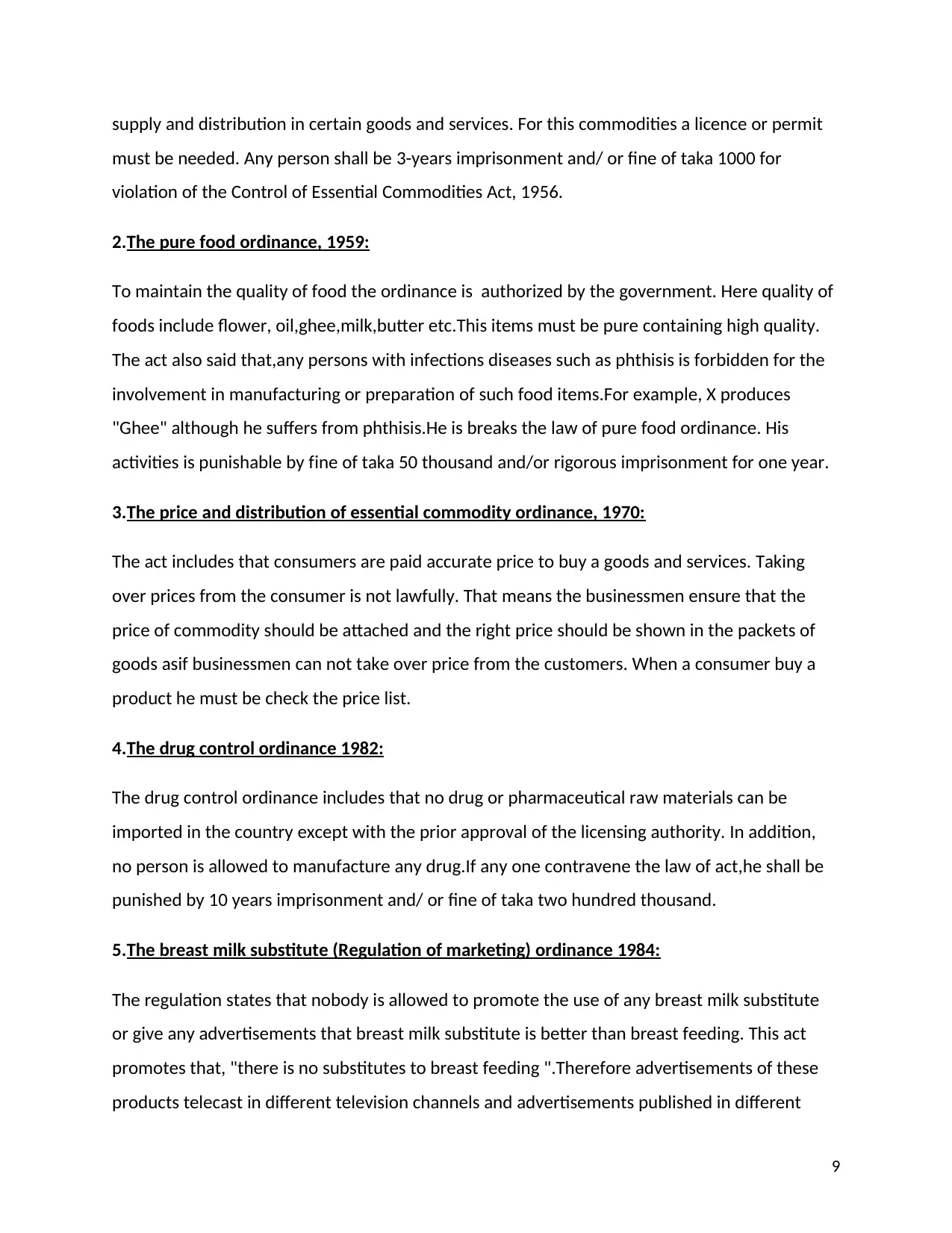
supply and distribution in certain goods and services. For this commodities a licence or permit
must be needed. Any person shall be 3-years imprisonment and/ or fine of taka 1000 for
violation of the Control of Essential Commodities Act, 1956.
2.The pure food ordinance, 1959:
To maintain the quality of food the ordinance is authorized by the government. Here quality of
foods include flower, oil,ghee,milk,butter etc.This items must be pure containing high quality.
The act also said that,any persons with infections diseases such as phthisis is forbidden for the
involvement in manufacturing or preparation of such food items.For example, X produces
"Ghee" although he suffers from phthisis.He is breaks the law of pure food ordinance. His
activities is punishable by fine of taka 50 thousand and/or rigorous imprisonment for one year.
3.The price and distribution of essential commodity ordinance, 1970:
The act includes that consumers are paid accurate price to buy a goods and services. Taking
over prices from the consumer is not lawfully. That means the businessmen ensure that the
price of commodity should be attached and the right price should be shown in the packets of
goods asif businessmen can not take over price from the customers. When a consumer buy a
product he must be check the price list.
4.The drug control ordinance 1982:
The drug control ordinance includes that no drug or pharmaceutical raw materials can be
imported in the country except with the prior approval of the licensing authority. In addition,
no person is allowed to manufacture any drug.If any one contravene the law of act,he shall be
punished by 10 years imprisonment and/ or fine of taka two hundred thousand.
5.The breast milk substitute (Regulation of marketing) ordinance 1984:
The regulation states that nobody is allowed to promote the use of any breast milk substitute
or give any advertisements that breast milk substitute is better than breast feeding. This act
promotes that, "there is no substitutes to breast feeding ".Therefore advertisements of these
products telecast in different television channels and advertisements published in different
9
must be needed. Any person shall be 3-years imprisonment and/ or fine of taka 1000 for
violation of the Control of Essential Commodities Act, 1956.
2.The pure food ordinance, 1959:
To maintain the quality of food the ordinance is authorized by the government. Here quality of
foods include flower, oil,ghee,milk,butter etc.This items must be pure containing high quality.
The act also said that,any persons with infections diseases such as phthisis is forbidden for the
involvement in manufacturing or preparation of such food items.For example, X produces
"Ghee" although he suffers from phthisis.He is breaks the law of pure food ordinance. His
activities is punishable by fine of taka 50 thousand and/or rigorous imprisonment for one year.
3.The price and distribution of essential commodity ordinance, 1970:
The act includes that consumers are paid accurate price to buy a goods and services. Taking
over prices from the consumer is not lawfully. That means the businessmen ensure that the
price of commodity should be attached and the right price should be shown in the packets of
goods asif businessmen can not take over price from the customers. When a consumer buy a
product he must be check the price list.
4.The drug control ordinance 1982:
The drug control ordinance includes that no drug or pharmaceutical raw materials can be
imported in the country except with the prior approval of the licensing authority. In addition,
no person is allowed to manufacture any drug.If any one contravene the law of act,he shall be
punished by 10 years imprisonment and/ or fine of taka two hundred thousand.
5.The breast milk substitute (Regulation of marketing) ordinance 1984:
The regulation states that nobody is allowed to promote the use of any breast milk substitute
or give any advertisements that breast milk substitute is better than breast feeding. This act
promotes that, "there is no substitutes to breast feeding ".Therefore advertisements of these
products telecast in different television channels and advertisements published in different
9
⊘ This is a preview!⊘
Do you want full access?
Subscribe today to unlock all pages.

Trusted by 1+ million students worldwide
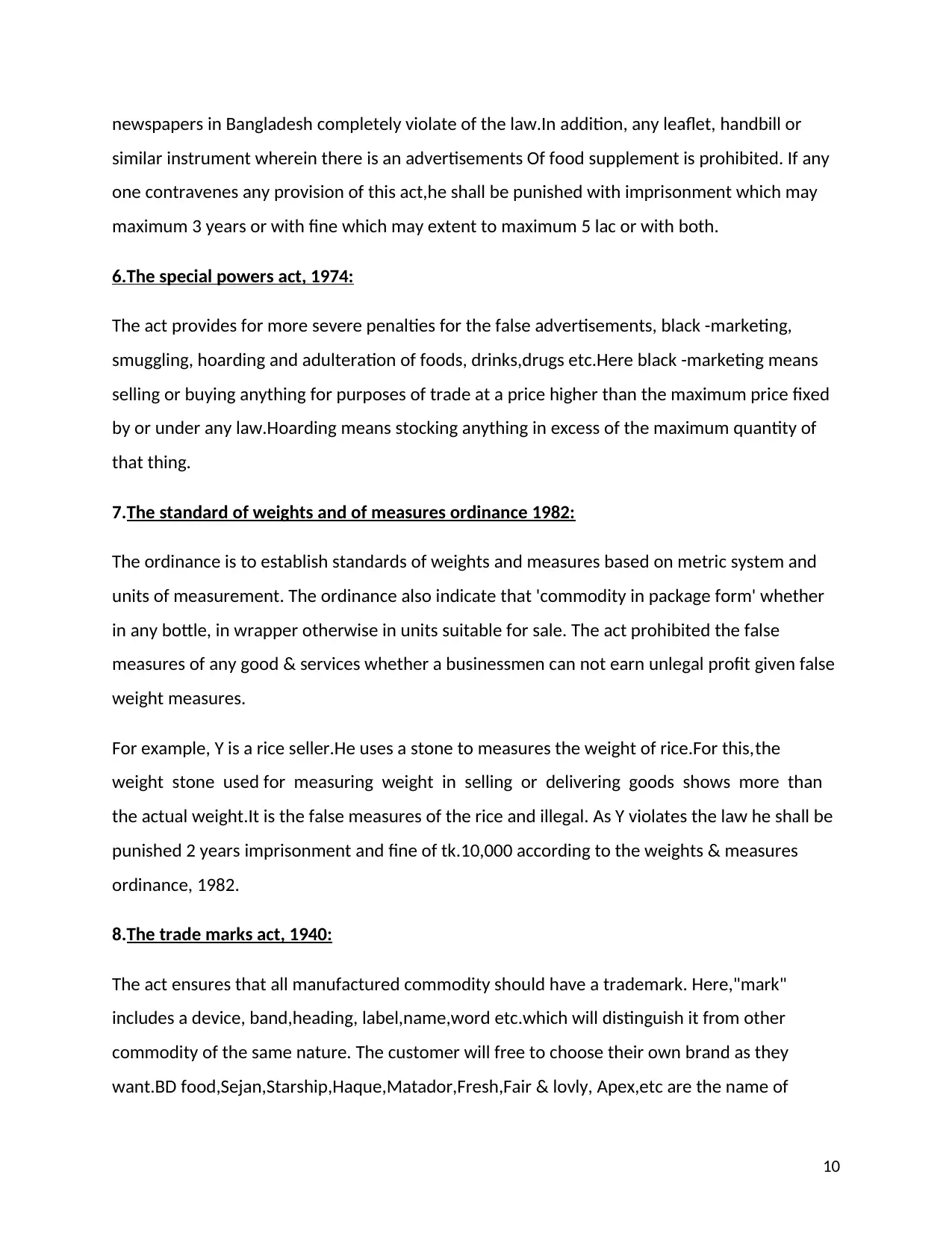
newspapers in Bangladesh completely violate of the law.In addition, any leaflet, handbill or
similar instrument wherein there is an advertisements Of food supplement is prohibited. If any
one contravenes any provision of this act,he shall be punished with imprisonment which may
maximum 3 years or with fine which may extent to maximum 5 lac or with both.
6.The special powers act, 1974:
The act provides for more severe penalties for the false advertisements, black -marketing,
smuggling, hoarding and adulteration of foods, drinks,drugs etc.Here black -marketing means
selling or buying anything for purposes of trade at a price higher than the maximum price fixed
by or under any law.Hoarding means stocking anything in excess of the maximum quantity of
that thing.
7.The standard of weights and of measures ordinance 1982:
The ordinance is to establish standards of weights and measures based on metric system and
units of measurement. The ordinance also indicate that 'commodity in package form' whether
in any bottle, in wrapper otherwise in units suitable for sale. The act prohibited the false
measures of any good & services whether a businessmen can not earn unlegal profit given false
weight measures.
For example, Y is a rice seller.He uses a stone to measures the weight of rice.For this,the
weight stone used for measuring weight in selling or delivering goods shows more than
the actual weight.It is the false measures of the rice and illegal. As Y violates the law he shall be
punished 2 years imprisonment and fine of tk.10,000 according to the weights & measures
ordinance, 1982.
8.The trade marks act, 1940:
The act ensures that all manufactured commodity should have a trademark. Here,"mark"
includes a device, band,heading, label,name,word etc.which will distinguish it from other
commodity of the same nature. The customer will free to choose their own brand as they
want.BD food,Sejan,Starship,Haque,Matador,Fresh,Fair & lovly, Apex,etc are the name of
10
similar instrument wherein there is an advertisements Of food supplement is prohibited. If any
one contravenes any provision of this act,he shall be punished with imprisonment which may
maximum 3 years or with fine which may extent to maximum 5 lac or with both.
6.The special powers act, 1974:
The act provides for more severe penalties for the false advertisements, black -marketing,
smuggling, hoarding and adulteration of foods, drinks,drugs etc.Here black -marketing means
selling or buying anything for purposes of trade at a price higher than the maximum price fixed
by or under any law.Hoarding means stocking anything in excess of the maximum quantity of
that thing.
7.The standard of weights and of measures ordinance 1982:
The ordinance is to establish standards of weights and measures based on metric system and
units of measurement. The ordinance also indicate that 'commodity in package form' whether
in any bottle, in wrapper otherwise in units suitable for sale. The act prohibited the false
measures of any good & services whether a businessmen can not earn unlegal profit given false
weight measures.
For example, Y is a rice seller.He uses a stone to measures the weight of rice.For this,the
weight stone used for measuring weight in selling or delivering goods shows more than
the actual weight.It is the false measures of the rice and illegal. As Y violates the law he shall be
punished 2 years imprisonment and fine of tk.10,000 according to the weights & measures
ordinance, 1982.
8.The trade marks act, 1940:
The act ensures that all manufactured commodity should have a trademark. Here,"mark"
includes a device, band,heading, label,name,word etc.which will distinguish it from other
commodity of the same nature. The customer will free to choose their own brand as they
want.BD food,Sejan,Starship,Haque,Matador,Fresh,Fair & lovly, Apex,etc are the name of
10
Paraphrase This Document
Need a fresh take? Get an instant paraphrase of this document with our AI Paraphraser
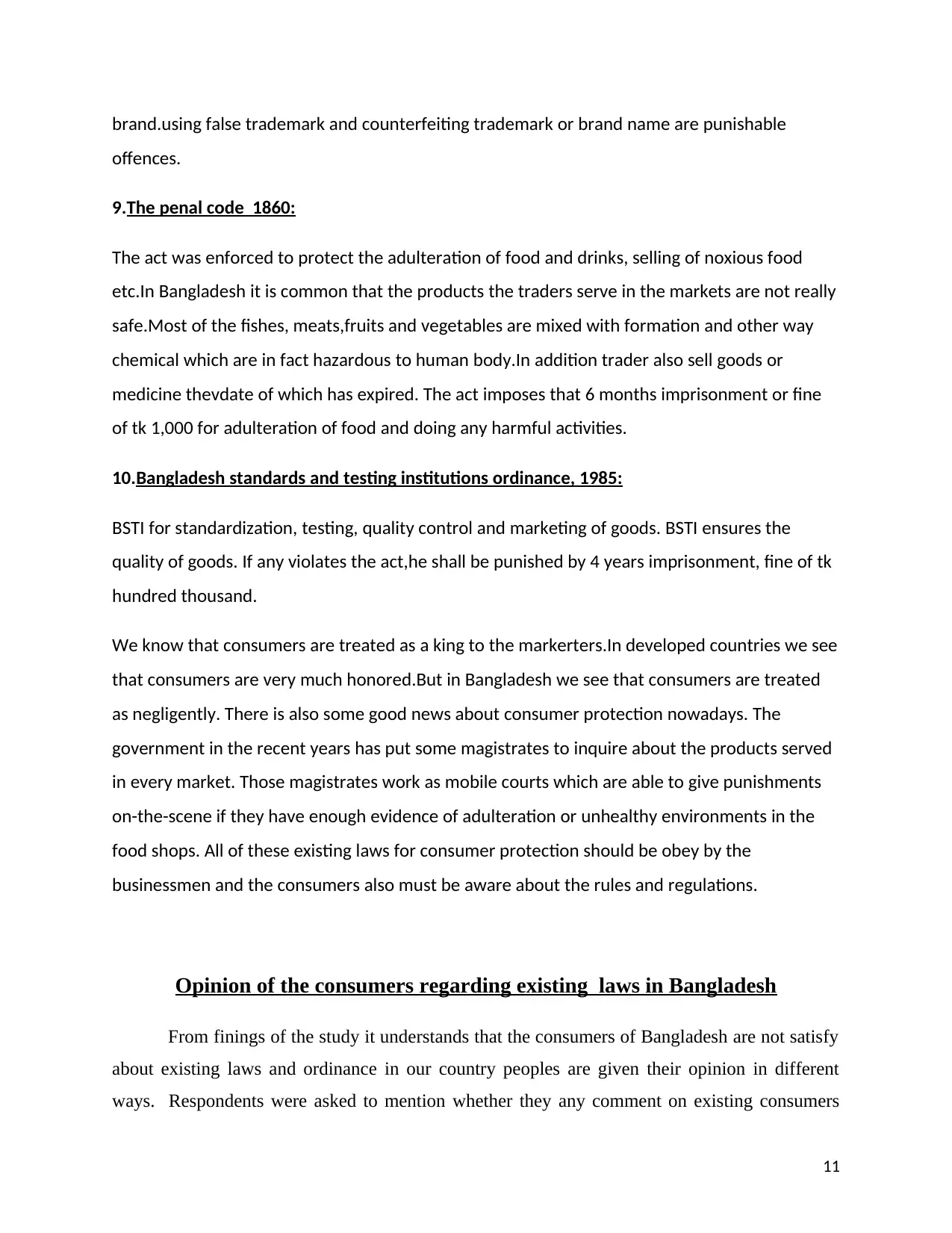
brand.using false trademark and counterfeiting trademark or brand name are punishable
offences.
9.The penal code 1860:
The act was enforced to protect the adulteration of food and drinks, selling of noxious food
etc.In Bangladesh it is common that the products the traders serve in the markets are not really
safe.Most of the fishes, meats,fruits and vegetables are mixed with formation and other way
chemical which are in fact hazardous to human body.In addition trader also sell goods or
medicine thevdate of which has expired. The act imposes that 6 months imprisonment or fine
of tk 1,000 for adulteration of food and doing any harmful activities.
10.Bangladesh standards and testing institutions ordinance, 1985:
BSTI for standardization, testing, quality control and marketing of goods. BSTI ensures the
quality of goods. If any violates the act,he shall be punished by 4 years imprisonment, fine of tk
hundred thousand.
We know that consumers are treated as a king to the markerters.In developed countries we see
that consumers are very much honored.But in Bangladesh we see that consumers are treated
as negligently. There is also some good news about consumer protection nowadays. The
government in the recent years has put some magistrates to inquire about the products served
in every market. Those magistrates work as mobile courts which are able to give punishments
on-the-scene if they have enough evidence of adulteration or unhealthy environments in the
food shops. All of these existing laws for consumer protection should be obey by the
businessmen and the consumers also must be aware about the rules and regulations.
Opinion of the consumers regarding existing laws in Bangladesh
From finings of the study it understands that the consumers of Bangladesh are not satisfy
about existing laws and ordinance in our country peoples are given their opinion in different
ways. Respondents were asked to mention whether they any comment on existing consumers
11
offences.
9.The penal code 1860:
The act was enforced to protect the adulteration of food and drinks, selling of noxious food
etc.In Bangladesh it is common that the products the traders serve in the markets are not really
safe.Most of the fishes, meats,fruits and vegetables are mixed with formation and other way
chemical which are in fact hazardous to human body.In addition trader also sell goods or
medicine thevdate of which has expired. The act imposes that 6 months imprisonment or fine
of tk 1,000 for adulteration of food and doing any harmful activities.
10.Bangladesh standards and testing institutions ordinance, 1985:
BSTI for standardization, testing, quality control and marketing of goods. BSTI ensures the
quality of goods. If any violates the act,he shall be punished by 4 years imprisonment, fine of tk
hundred thousand.
We know that consumers are treated as a king to the markerters.In developed countries we see
that consumers are very much honored.But in Bangladesh we see that consumers are treated
as negligently. There is also some good news about consumer protection nowadays. The
government in the recent years has put some magistrates to inquire about the products served
in every market. Those magistrates work as mobile courts which are able to give punishments
on-the-scene if they have enough evidence of adulteration or unhealthy environments in the
food shops. All of these existing laws for consumer protection should be obey by the
businessmen and the consumers also must be aware about the rules and regulations.
Opinion of the consumers regarding existing laws in Bangladesh
From finings of the study it understands that the consumers of Bangladesh are not satisfy
about existing laws and ordinance in our country peoples are given their opinion in different
ways. Respondents were asked to mention whether they any comment on existing consumers
11
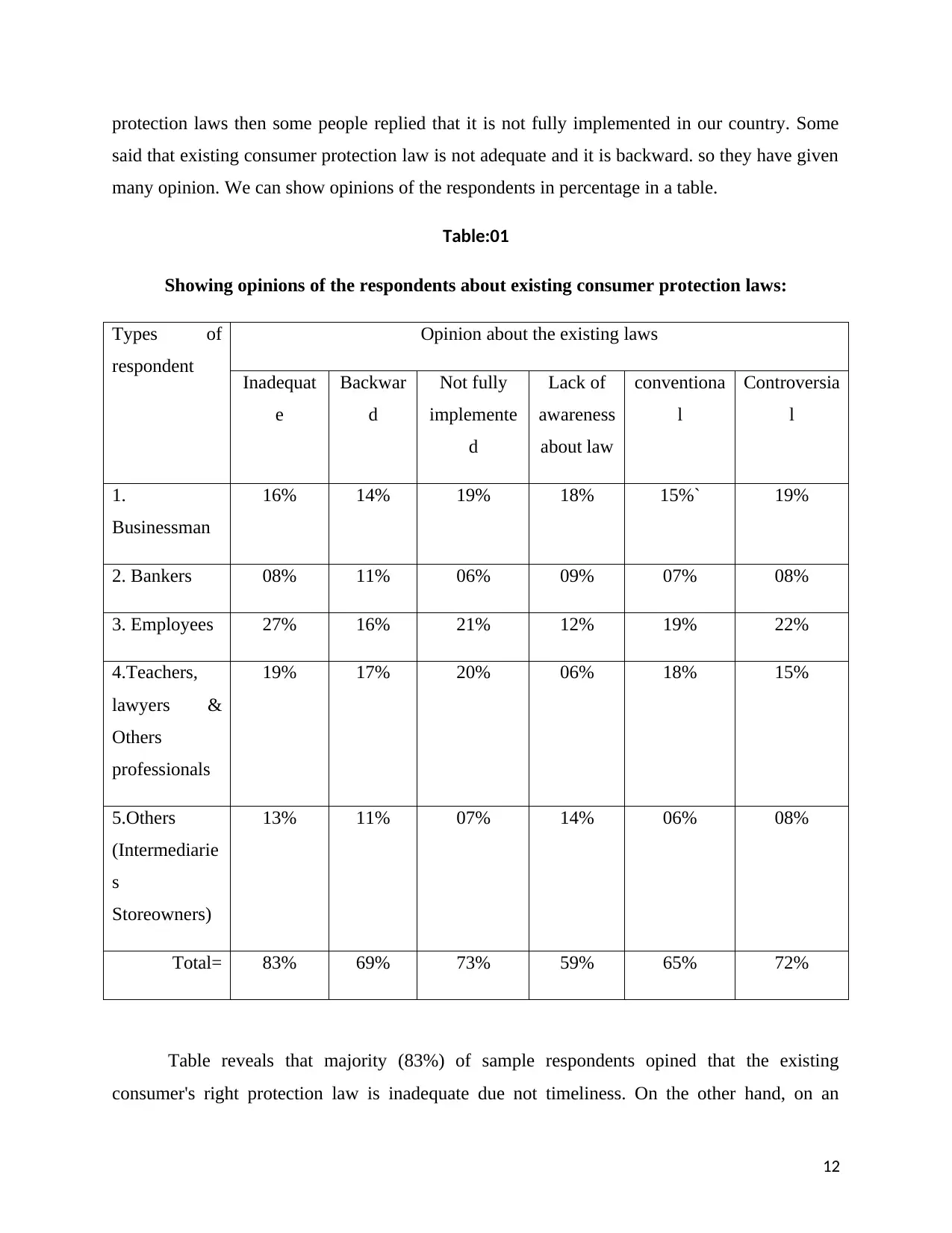
protection laws then some people replied that it is not fully implemented in our country. Some
said that existing consumer protection law is not adequate and it is backward. so they have given
many opinion. We can show opinions of the respondents in percentage in a table.
Table:01
Showing opinions of the respondents about existing consumer protection laws:
Types of
respondent
Opinion about the existing laws
Inadequat
e
Backwar
d
Not fully
implemente
d
Lack of
awareness
about law
conventiona
l
Controversia
l
1.
Businessman
16% 14% 19% 18% 15%` 19%
2. Bankers 08% 11% 06% 09% 07% 08%
3. Employees 27% 16% 21% 12% 19% 22%
4.Teachers,
lawyers &
Others
professionals
19% 17% 20% 06% 18% 15%
5.Others
(Intermediarie
s
Storeowners)
13% 11% 07% 14% 06% 08%
Total= 83% 69% 73% 59% 65% 72%
Table reveals that majority (83%) of sample respondents opined that the existing
consumer's right protection law is inadequate due not timeliness. On the other hand, on an
12
said that existing consumer protection law is not adequate and it is backward. so they have given
many opinion. We can show opinions of the respondents in percentage in a table.
Table:01
Showing opinions of the respondents about existing consumer protection laws:
Types of
respondent
Opinion about the existing laws
Inadequat
e
Backwar
d
Not fully
implemente
d
Lack of
awareness
about law
conventiona
l
Controversia
l
1.
Businessman
16% 14% 19% 18% 15%` 19%
2. Bankers 08% 11% 06% 09% 07% 08%
3. Employees 27% 16% 21% 12% 19% 22%
4.Teachers,
lawyers &
Others
professionals
19% 17% 20% 06% 18% 15%
5.Others
(Intermediarie
s
Storeowners)
13% 11% 07% 14% 06% 08%
Total= 83% 69% 73% 59% 65% 72%
Table reveals that majority (83%) of sample respondents opined that the existing
consumer's right protection law is inadequate due not timeliness. On the other hand, on an
12
⊘ This is a preview!⊘
Do you want full access?
Subscribe today to unlock all pages.

Trusted by 1+ million students worldwide
1 out of 22
Related Documents
Your All-in-One AI-Powered Toolkit for Academic Success.
+13062052269
info@desklib.com
Available 24*7 on WhatsApp / Email
![[object Object]](/_next/static/media/star-bottom.7253800d.svg)
Unlock your academic potential
Copyright © 2020–2026 A2Z Services. All Rights Reserved. Developed and managed by ZUCOL.





